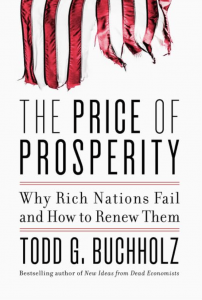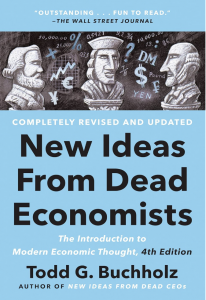LOS ANGELES, CA, UNITED STATES, December 17, 2024 /EINPresswire.com/ — Renowned economist Todd Buchholz believes there’s good news on the horizon for 2025, even in the face of mounting budget deficits, geopolitical strife in Ukraine, and bitter political divisions in the U.S. His optimism rests on three powerful trends encapsulated in the acronym “HIP” – Health, Information, and Power.
“While the headlines are grim, the undercurrents in our economy and society tell a more hopeful story,” says Buchholz, author of “The Price of Prosperity” and former White House director of economic policy. “Americans are innovating, adapting, and pushing forward in ways that promise a brighter future.”
Here’s why Todd Buchholz sees reasons to smile in 2025:
H: Health Consciousness Gains Momentum
“America has a new prescription for a healthier future,” Buchholz says. For decades, obesity has plagued the nation, driving up healthcare costs and eroding productivity. But thanks to the advent of GLP-1 drugs like Ozempic and Wegovy, Americans are beginning to tackle this crisis. These medications, initially developed for diabetes, are now transforming weight management, curbing obesity rates, and reducing the risks of heart disease and other chronic conditions. People who take such medicines for a year lose 6 to 16 percent of their weight. “For the first time in half a century, the obesity rate dipped a bit last year, though at 40%, it is still hazardous to our national health.”
Buchholz points to the larger cultural shift in health consciousness as well. Figures like Robert F. Kennedy, Jr., once dismissed as fringe voices, are using their platforms to draw attention to food safety and nutritional reform. “Whether you agree with RFK, Jr.’s broader agenda or not, he’s tapping into a national hunger for cleaner food,” Buchholz notes. “When you combine cultural momentum with medical breakthroughs, you get a population ready to make smarter choices—and that has huge economic and social benefits.”
I: Information Costs Are Plunging
Artificial Intelligence is revolutionizing the accessibility of information, driving costs down to nearly zero. Buchholz highlights how this is reshaping education and workforce development in profound ways. “Universities are fretting not just because birth rates are falling but because AI and the internet are making many lectures and resources redundant,” he explains. “Today, you can go from Dante to DNA research with a few clicks. That’s transformative.”
Critics argue that misinformation and propaganda online make this newfound access dangerous, but Buchholz counters: “Let’s be honest—there’s always been propaganda, even in the classroom. The difference now is that the gates have been flung open, and knowledge is no longer locked like Rapunzel at the top of ivory towers. It’s a revolution for learners everywhere.”
With online tools and platforms fueled by AI, more people can acquire skills, start businesses, and solve problems faster and more affordably than ever before. “A society where information flows freely is a society that innovates and grows,” Buchholz asserts.
P: Power Prices Are Falling
After years of soaring energy costs, the end of 2024 saw relief at the pump and for manufacturing plants, thanks to declining oil prices. Buchholz credits a renewed focus on domestic energy production, encouraged in part by the “drill, baby, drill” mantra coming from the new president. “Yes, it enrages environmentalists, but lower oil prices mean cheaper inputs for manufacturers and more disposable income for consumers,” he says.
Lower energy costs also have ripple effects across the economy. Transportation becomes less expensive, food prices stabilize, and some inflationary pressures ease. “Ironically, in addition to environmentalists, complaints may come from energy explorers, who may find new wells unprofitable,” he says.
Hope on the Horizon
Buchholz acknowledges the challenges ahead. The U.S. continues to grapple with political polarization, worrisome crime rates, spiraling debt, and global tensions. But he argues that focusing on the “HIP” trends—”Health, Information, and Power”—offers a roadmap to resilience.
“History teaches us that progress often happens in the shadows of crises,” Buchholz concludes. “We can’t ignore the dark forces that try to undermine the U.S. But despite those shadows, Americans can grow healthier, smarter, more resourceful, and more successful.”
Todd Buchholz is available for interviews.
To learn more about Buchholz and his impactful work, click here: https://www.toddbuchholz.com/
Amanda Kent
Boundless Media USA
+1 313-403-5636
email us here
Legal Disclaimer:
EIN Presswire provides this news content “as is” without warranty of any kind. We do not accept any responsibility or liability
for the accuracy, content, images, videos, licenses, completeness, legality, or reliability of the information contained in this
article. If you have any complaints or copyright issues related to this article, kindly contact the author above.
![]()





